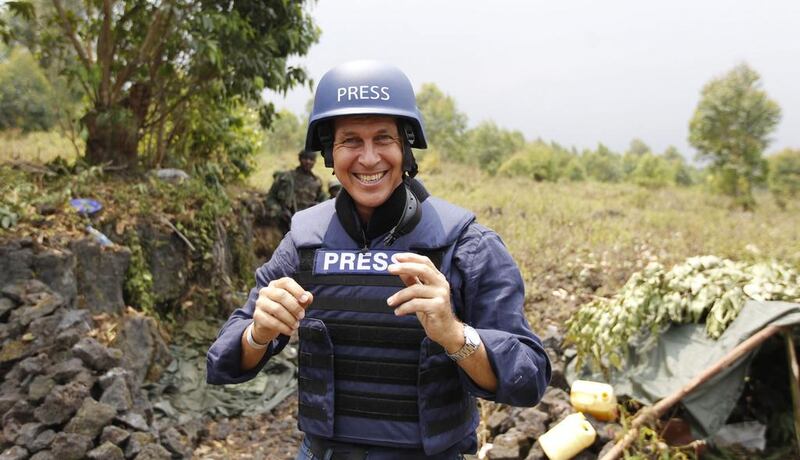CAIRO // Egypt deported Al Jazeera reporter Peter Greste to Australia on Sunday after holding him for more than 400 days despite global condemnation of his jailing on charges of backing the Muslim Brotherhood.
Greste departed on a flight to Larnaca in Cyprus soon after his release from Cairo’s Tora prison, interior ministry and airport officials said.
Airport sources at Larnaca confirmed Greste had arrived on an EgyptAir flight accompanied by his brother Michael.
The Al Jazeera English reporter was detained along with two colleagues, Canadian-Egyptian Mohamed Fahmy and an Egyptian producer, Baher Mohamed, in December 2013 and charged with aiding the blacklisted Brotherhood movement.
The Qatar-based channel welcomed Cairo’s decision and expressed the hope that its other two journalists would also be released.
“We’re pleased for Peter and his family that they are to be reunited,” Mostefa Souag, acting director general of Al Jazeera Media Network, said in a statement.
Fahmy is expected to be released from an Egyptian prison within days, a security official said on Sunday.
Fahmy’s relatives also expect him to be deported under a decree passed by president Abdel Fattah El Sisi that allows for the transfer of foreigners on trial.
The arrest of the three journalists sparked a global outcry, with Washington and the United Nations leading calls for their release.
Australia and Canada have piled pressure on Egypt to release the two, and Mr El Sisi had repeatedly said he regretted they had not been deported soon after their arrest.
Their high-profile trial, at which Greste and Fahmy were sentenced to seven years in prison and Mohamed to 10, proved a public-relations nightmare for Mr El Sisi, who has cracked down on supporters of the Muslim Brotherhood’s Mohammed Morsi after removing him from the presidency in July 2013.
The verdict was overturned and a court in January ordered a retrial for the three.
“There is a presidential decision to deport Peter Greste to Australia,” an interior ministry official said on Sunday, minutes before Greste flew out from Cairo.
Greste and Fahmy are eligible for deportation under a recent law that stipulates their trial in their home countries.
Media watchdog the Committee to Protect Journalists welcomed Greste’s release and called on Mr El to pardon and free Fahmy and Mohamed “and the other journalists still behind bars for doing their work”.
Police arrested the journalists at the peak of a diplomatic row between Cairo and Qatar, which owns Al Jazeera.
The broadcaster had been critical of the deadly crackdown on Mr Morsi’s Muslim Brotherhood movement following his overthrow.
Qatar has since moved to mend ties with Egypt, and Al Jazeera has closed its Arabic-language Egyptian affiliate which backed the Brotherhood.
The rapprochement reflected growing international acceptance of the crackdown on Egypt’s opposition and militants who have killed scores of police and soldiers since Mr Morsi’s overthrow.
Greste, who turned 49 in jail, worked for several news organisations including Reuters and the BBC before joining Al Jazeera English.
He was the BBC’s Kabul correspondent in 1995.
From 2009, he was based in Nairobi from where he covered the Horn of Africa, winning the broadcasting industry’s prestigious Peabody Award in 2011.
* Agence France-Presse, Reuters





